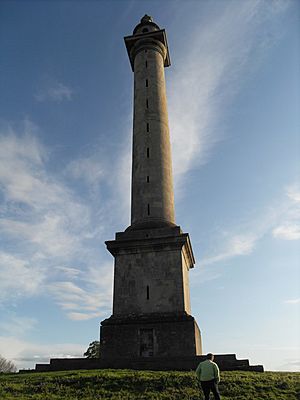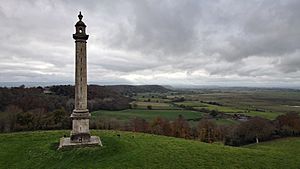Burton Pynsent Monument facts for kids
Quick facts for kids Burton Pynsent Monument |
|
|---|---|
 |
|
| Location | Curry Rivel, Somerset, England |
| Built | 1767 |
|
Listed Building – Grade I
|
|
| Designated | 17 April 1959 |
| Reference no. | 431251 |
| Lua error in Module:Location_map at line 420: attempt to index field 'wikibase' (a nil value). | |
The Burton Pynsent Monument is a tall stone tower in Curry Rivel, Somerset, England. It stands on Troy Hill, a high spot that offers great views. This monument was built way back in 1767. It's considered a very important historical building, known as a Grade I listed building. This means it's protected because of its special history and design.
People sometimes call this tower by other names. These include the Curry Rivel Column, Pynsent Column, Pynsent Steeple, or even the Cider Monument.
Contents
Why Was the Monument Built?
The monument was built to honor a man named Sir William Pynsent. He was a wealthy landowner from the area. The person who had it built was a famous politician, William Pitt.
Who Was Sir William Pynsent?
Sir William Pynsent was very grateful to William Pitt. Pitt had spoken out against a new tax that would have affected Pynsent's business. Because of this, when Sir William Pynsent passed away, he left all his property and money to William Pitt.
What Was the Cider Tax?
In 1763, the government wanted to add a tax on cider. This was called the 1763 Cider Bill. The tax would have made cider more expensive. Sir William Pynsent produced a lot of cider, so this tax would have cost him a lot of money. William Pitt helped to oppose this tax.
Pitt used some of the money he inherited from Pynsent to build this monument. It cost about £2,000 at the time, which was a lot of money! It was his way of thanking Sir William Pynsent for his generous gift.
Who Designed and Built It?
The monument was designed by a famous landscape architect named Capability Brown. He was known for designing beautiful gardens and estates. The actual building work was done by Philip Pear. The tower is covered in a special type of stone called Portland Stone.
Fun Facts About the Monument
In June 1948, something very unusual happened at the monument. A young cow, called a heifer, managed to climb all 172 steps to the very top! Luckily, she was safely brought back down to her field.
Keeping the Monument Standing
Over the years, the monument needed some care to stay in good condition. In the 1990s, it was restored. This work was supported by the John Paul Getty Trust and English Heritage. These organizations help to protect important historical sites.


